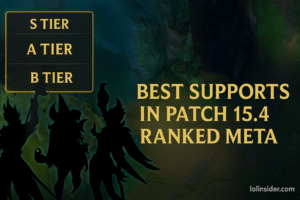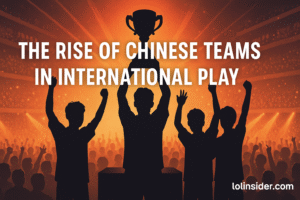The role of coaches in LoL esports has grown dramatically over the past decade. In the early years of competitive League of Legends, teams often played without structured leadership, relying on raw talent and in-game shot-calling to win. Today, coaching staff is considered an essential part of every professional roster, influencing everything from draft strategies and player performance to mental resilience and long-term success.
In this article, we’ll explore how coaches have shaped the esports scene, the responsibilities they carry, and why their impact is often the deciding factor in a team’s success.
🏆 From Players to Professionals: The Evolution of Coaching
When League of Legends esports first launched in 2010–2012, most teams lacked formal coaches. Players practiced on their own, learned strategies through trial and error, and focused heavily on mechanical skill. However, as the competitive landscape matured and tournaments like Worlds gained international prestige, the need for structured leadership became clear.
By 2014–2015, regions like Korea had already set the standard for professional coaching. Korean teams introduced analysts, positional coaches, and strict training regimens. This professionalization became the blueprint that regions such as NA, EU, and China would later adopt.
📋 What Does a Coach Do in LoL Esports?
The role of a coach in LoL esports is multi-faceted, often extending beyond what fans see on stage.
1. Draft Preparation and Strategy
- Coaches design team compositions that maximize player strengths.
- They study opponent tendencies and prepare counter-picks.
- They ensure the draft phase follows a larger strategic plan rather than impulsive choices.
2. Player Development
- Coaches help players refine mechanics and decision-making.
- They provide constructive feedback after scrims and matches.
- Positional coaches focus on improving role-specific skills (e.g., laning, wave control, jungle pathing).
3. Mental and Emotional Support
- Competitive pressure is enormous in LoL esports. Coaches help players manage stress, burnout, and tilt.
- They encourage positive team culture and resolve conflicts.
4. Data and Analysis
- With the rise of analytics, many coaching staffs employ analysts to break down replays, statistics, and opponent tendencies.
- Coaches use this data to inform pick/ban strategies and identify weaknesses.
5. Team Synergy and Communication
- Coaches emphasize communication clarity in-game.
- They assign leadership roles, ensuring shot-calling is consistent.
- They foster trust and cohesion among teammates.
🔑 Why Coaches Are Essential to Success
Korean Dominance as Proof
The success of Korean teams like SK Telecom T1 (now T1) demonstrated the effectiveness of strong coaching. Legendary head coach kkOma was instrumental in building a dynasty around Faker, setting the gold standard for LoL coaching worldwide.
Western Breakthroughs
When Fnatic reached the Worlds 2018 finals and G2 Esports dominated in 2019, both organizations credited their coaching staffs for innovative drafts and player development.
Chinese Superpowers
Teams like EDG and RNG showed that investment in high-quality coaches can close the gap with Korea, resulting in World Championships and MSI victories.
⚖️ The Difference Between Good and Great Coaches
Not all coaches achieve the same results. Here’s what separates the great ones:
- Adaptability: Adjusting strategies mid-tournament.
- Innovation: Creating unique drafts and meta-shifts.
- Leadership: Maintaining authority while earning player trust.
- Longevity: Building sustainable success rather than short-term wins.
🧠 Case Studies of Famous LoL Coaches
- kkOma (SKT T1/T1)
- Three-time Worlds champion coach.
- Known for discipline, draft mastery, and maximizing Faker’s potential.
- Youngbuck (Fnatic, G2, Excel)
- Dubbed the “Six Star General” for his LEC titles.
- Renowned for strategic flexibility and nurturing rookies.
- Cain (Team Liquid)
- Helped TL dominate the LCS from 2018–2019.
- Balanced imported star talent with NA rookies.
🌍 Regional Approaches to Coaching
- Korea: Strict, discipline-driven, with multiple assistant coaches.
- China: Focus on raw talent development with tactical flexibility.
- Europe: Emphasis on innovation and adapting to meta.
- North America: Player-centric, but still catching up in depth and structure.
🚀 The Future of Coaching in LoL Esports
As esports grows, coaching will likely expand further:
- Performance staff: Including sports psychologists, nutritionists, and physical trainers.
- AI and data tools: Coaches may use advanced analytics to predict outcomes.
- Global influence: Coaches from Korea and China continue to spread knowledge to Western regions.
The role of coaches in LoL esports success is no longer behind the scenes—it is central to the narrative of victory.
📝 Final Thoughts
The role of coaches in LoL esports success cannot be overstated. From drafting strategies and developing talent to keeping players mentally strong, coaches are the architects of victory. While the spotlight often shines on star players, it is the coaches who design the playbook, enforce discipline, and cultivate the culture that leads to championship wins.
For beginners and fans alike, understanding coaching provides a deeper appreciation of the complexity behind every professional match.







